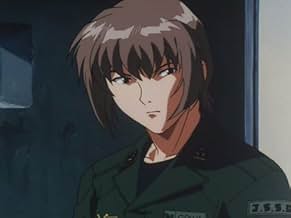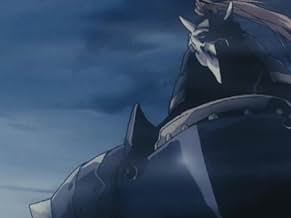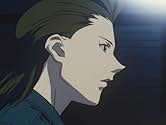Ajouter une intrigue dans votre langueThe US and fictional Middle-Eastern Belgistan are at war. The US takes heavy loses when Belgistan uses their giant robots, but they get help in military aid from Japan including a superb gia... Tout lireThe US and fictional Middle-Eastern Belgistan are at war. The US takes heavy loses when Belgistan uses their giant robots, but they get help in military aid from Japan including a superb giant robot and its Japanese pilot.The US and fictional Middle-Eastern Belgistan are at war. The US takes heavy loses when Belgistan uses their giant robots, but they get help in military aid from Japan including a superb giant robot and its Japanese pilot.
Parcourir les épisodes
Avis à la une
I feel that this is a fairly underrated anime. Stylistically it may be a little dull and the pontificating philosophical ramblings don't translate well (have you seen an anime where they do?), but there is something else about it that makes it a rare find. It shows a level of political awareness and self-knowledge one rarely sees from the Japanese (yes, I'm invoking the stereotype of Japanese political obliviousness).
As a mecha anime it's a bit prosaic and Yuushiro is your usual introverted, teenage, Shinji-esquire (though he seems to lack the introspection required to be repressed) cardboard cutout you find in many animes. The show is wonderfully contemporary though, even if its analysis of events in the Middle East is a little superficial. This is forgivable as the focus seems to be very much on Japan's ambiguous role in the world. Here you see the corrupting influence of the keiretsus on the government and the tempting influence of Japan's traditional, martial past. The presence of elements of traditional Japanese culture, such as Noh, family hierarchy (and its influence on the nature of powerful, family-owned conglomerates), and, yes, samurai, may satisfy western viewers who have noticed a lack of cultural introspection in anime (if you want to see more I recommend Samurai Champloo; not as good as Bebop, but Watanabe's style is recognisable).
Far from the knee-jerk moral dichotomies which are frequently inserted into politics in today's world, there is one very notable scene in particular where the commanding officer of Yuushiro's unit makes a poetic and beautifully articulate justification for where their duties lie after there is a political wind change in Japan, even as he wrestles with his own conscience. You rarely see such depictions of the warrior-poet in fiction anymore, presumably because it's not pc.
Drawbacks of the series include, depending on your degree of patience, a slowly plodding plot and a disappointing finale which summons the clichéd deus ex machina (which REALLY comes out of left field) one expects from the finales of such animes.
As a mecha anime it's a bit prosaic and Yuushiro is your usual introverted, teenage, Shinji-esquire (though he seems to lack the introspection required to be repressed) cardboard cutout you find in many animes. The show is wonderfully contemporary though, even if its analysis of events in the Middle East is a little superficial. This is forgivable as the focus seems to be very much on Japan's ambiguous role in the world. Here you see the corrupting influence of the keiretsus on the government and the tempting influence of Japan's traditional, martial past. The presence of elements of traditional Japanese culture, such as Noh, family hierarchy (and its influence on the nature of powerful, family-owned conglomerates), and, yes, samurai, may satisfy western viewers who have noticed a lack of cultural introspection in anime (if you want to see more I recommend Samurai Champloo; not as good as Bebop, but Watanabe's style is recognisable).
Far from the knee-jerk moral dichotomies which are frequently inserted into politics in today's world, there is one very notable scene in particular where the commanding officer of Yuushiro's unit makes a poetic and beautifully articulate justification for where their duties lie after there is a political wind change in Japan, even as he wrestles with his own conscience. You rarely see such depictions of the warrior-poet in fiction anymore, presumably because it's not pc.
Drawbacks of the series include, depending on your degree of patience, a slowly plodding plot and a disappointing finale which summons the clichéd deus ex machina (which REALLY comes out of left field) one expects from the finales of such animes.
I've seen about the first 12 episodes. At first it was bizarre & disconnected, then overly technical. They have looong speeches about how the robots work, with no real purpose. I got the box set for Christmas, so I plan to finish it, but I end up doing Sudoku the entire time. The only remotely interesting parts deal with the various political plots & assassinations, but those are few & far between. The three distinct plot lines have absolutely no relation to each other, and now there appear to be clone things or something that is not even explained or relevant. The voice acting is terrible - it is more suited to a comedy than a drama.
Chances are, you've never really seen anything like Gasaraki. Probably because there isn't anything really like Gasaraki.
Gasaraki is a show about politics, a family, spirituality, mechs, and more politics.
The show opens with a test of the Japanese Special Self Defense Forces' new Tactical Armor, a bipedal weapon with unprecedented mobility in an urban environment. The mechs are very well-designed, and look like the sort of thing that the US military might actually produce.
Then we are treated to a Noh dance, being performed by one of the pilots of the Tactical Armor. During the dance, bizarre phenomena occur, including gravity increases, and a girl appearing to him in a vision, begging him not to bring back "the terror."
And then we learn that the pilot/Noh dancer is Yushiro Gowa, one of the children of the Gowa family. The Gowa family also just happens to be developing the TA for the army.
And that's just the first episode.
Much of the show is produced in a style similar to the news coverage of Operation Desert Storm in 1991, further adding to the realism of the situation, which includes the US invading a (fictional) middle eastern nation which appears to have developed weapons of mass destruction.
The animation is uniformly high quality, fluid and clean. I've never seen a show produced for television that looked this good.
The show was written by people who actually understood politics, and that is a breath of fresh air. With a complex geopolitical scene as a backdrop, Gasaraki constantly has surprises for the viewer, as well as the constant sense of mystery surrounding the "terror" of a thousand years past.
Some have compared the show to Evangelion, but such a comparison is flawed. Gasaraki is much darker and more complex plot-wise. Where Evangelion is about Hideako Anno's personal views on spirituality, Gasaraki is about politics, with a dose of spirituality to add mystery. Beyond the obvious similarity of mecha and spiritual elements, there's really no comparison.
In summary: Gasaraki is not for those with short attention spans. Gasaraki will reward those who pay attention to detail. Gasaraki is a triumph of substance over style, a rarity in the world of anime these days.
Gasaraki is a show about politics, a family, spirituality, mechs, and more politics.
The show opens with a test of the Japanese Special Self Defense Forces' new Tactical Armor, a bipedal weapon with unprecedented mobility in an urban environment. The mechs are very well-designed, and look like the sort of thing that the US military might actually produce.
Then we are treated to a Noh dance, being performed by one of the pilots of the Tactical Armor. During the dance, bizarre phenomena occur, including gravity increases, and a girl appearing to him in a vision, begging him not to bring back "the terror."
And then we learn that the pilot/Noh dancer is Yushiro Gowa, one of the children of the Gowa family. The Gowa family also just happens to be developing the TA for the army.
And that's just the first episode.
Much of the show is produced in a style similar to the news coverage of Operation Desert Storm in 1991, further adding to the realism of the situation, which includes the US invading a (fictional) middle eastern nation which appears to have developed weapons of mass destruction.
The animation is uniformly high quality, fluid and clean. I've never seen a show produced for television that looked this good.
The show was written by people who actually understood politics, and that is a breath of fresh air. With a complex geopolitical scene as a backdrop, Gasaraki constantly has surprises for the viewer, as well as the constant sense of mystery surrounding the "terror" of a thousand years past.
Some have compared the show to Evangelion, but such a comparison is flawed. Gasaraki is much darker and more complex plot-wise. Where Evangelion is about Hideako Anno's personal views on spirituality, Gasaraki is about politics, with a dose of spirituality to add mystery. Beyond the obvious similarity of mecha and spiritual elements, there's really no comparison.
In summary: Gasaraki is not for those with short attention spans. Gasaraki will reward those who pay attention to detail. Gasaraki is a triumph of substance over style, a rarity in the world of anime these days.
Although it can be confusing to begin with, don't judge after the first few episodes it really is worth watching all the way through as more is revealed. The robots are very primitive mecha for anime making it a more realistic weapon to be used in the situations featured in the film which relate alot to the recent goings on in the east. The series is very political and relies alot on political tactics to move the story froward rather than all action. Aswell as this you also have the history of the Gowa family revealing itself and it's hidden agendas within this political war. All in all very different to anything out at the moment and isn't just another mecha story well worth watching. Also the animation is very good considering it is a series for television.
I've seen the 1st 4 episodes on DVD, and it leaves me anxious for more.
Gasaraki is a blend of very realistic mecha warfare with Shinto mysticism, recent geopolitical history and Noh theater. If this sounds strange...well, it is. But it works, very well.
The series is organized sort of as an unfolding mystery, confusing at first, and as questions are answered, more questions pop up. We've got Yushiro Gawa, who is a crack mecha pilot, but (perhaps more importantly) a Noh Shite. The extended Gowa family run a weapons conglomerate, and are willing to manipulate politics to generate opportunities to show off their new TA mecha weapons platform. They're also conducting experiments on Yushiro as he Noh dances; his dance causes strange gravity anomolies.
...and some other organization seems to be developing very similar mecha systems and gravity effects. We're being set up for later conflict between these two groups.
The artwork of Gasaraki is wonderful; realistic hard edged military hardware juxtaposed against a delicate garden with koi swimming in a pool or traditional Japanese architecture. The Noh theater segments are otherworldly and haunting.
Check this one out.
Gasaraki is a blend of very realistic mecha warfare with Shinto mysticism, recent geopolitical history and Noh theater. If this sounds strange...well, it is. But it works, very well.
The series is organized sort of as an unfolding mystery, confusing at first, and as questions are answered, more questions pop up. We've got Yushiro Gawa, who is a crack mecha pilot, but (perhaps more importantly) a Noh Shite. The extended Gowa family run a weapons conglomerate, and are willing to manipulate politics to generate opportunities to show off their new TA mecha weapons platform. They're also conducting experiments on Yushiro as he Noh dances; his dance causes strange gravity anomolies.
...and some other organization seems to be developing very similar mecha systems and gravity effects. We're being set up for later conflict between these two groups.
The artwork of Gasaraki is wonderful; realistic hard edged military hardware juxtaposed against a delicate garden with koi swimming in a pool or traditional Japanese architecture. The Noh theater segments are otherworldly and haunting.
Check this one out.
Le saviez-vous
- AnecdotesThe opening animation changes with nearly every episode.
Meilleurs choix
Connectez-vous pour évaluer et suivre la liste de favoris afin de recevoir des recommandations personnalisées
Détails
- Couleur
- Rapport de forme
- 1.33 : 1
Contribuer à cette page
Suggérer une modification ou ajouter du contenu manquant

































